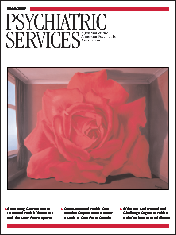Brief Reports: Self-Stigma, Empowerment, and Perceived Legitimacy of Discrimination Among Women With Mental Illness
Abstract
OBJECTIVE: The study sought to better understand why some people with mental illness self-stigmatize and develop low self-esteem while others remain indifferent to stigma or respond with a sense of empowerment. The authors hypothesized that a high level of perceived discrimination, little sense of identification with the group of people with mental illness, and a high level of perceived legitimacy of discrimination lead to self-stigma. METHODS: Sixty women with borderline personality disorder and 30 women with social phobia, who were recruited at three centers in Germany and Switzerland, completed stigma-related questionnaires. RESULTS: After depression and index diagnosis were controlled for, a low level of perceived discrimination and of the legitimacy of discrimination predicted high self-esteem and high empowerment. Identification with the group of people with mental illness did not predict self-esteem or empowerment. CONCLUSIONS: Perceived legitimacy of discrimination may be a crucial determinant of a person's response to stigma.



